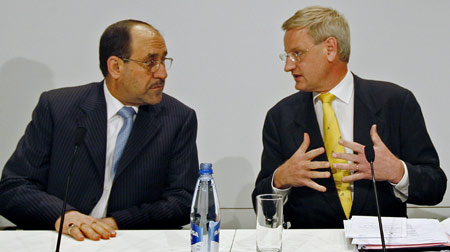
Iraqi Prime Minister Nuri al-Maliki (L) speaks with Swedish Foreign Minister Carl Bildt at a news conference after the first annual review of the International Compact with Iraq in Stockholm May 29, 2008. (Xinhua/Reuters Photo)
Maliki said he had not been given any timetable for debt reduction from these countries.
The attitudes of the two countries are crucial as the Paris Club countries have reserved the right to suspend part of the reduction if Iraq's neighbors would not reduce its debts in a similar fashion.
UN Secretary General Ban Ki-moon, who co-chaired the conference with Maliki, was upbeat about the progress Iraq has made.
"Indeed, notable progress has been made in all three pillars of the (International) Compact – in the security, political and economic fields, despite the challenges," said Ban in his opening speech.
"If I were asked to use one word to describe the situation in Iraq today, I would choose the word 'hope'."
At the end of the conference, he told reporters that he walked away encouraged by the renewed support of the international community for Iraq.
US Secretary of State Condoleezza Rice also hailed Iraq's achievements in security and democracy. She asked Iraq's neighbors and the broader international community for further help.
"Iraq requires regional and international support to succeed," Rice said in her speech.
"Increased diplomatic, economic, social and cultural engagement with the people of Iraq is essential. We urge Iraq's neighbors and friends to strengthen these ties through official visits to Iraq, the reopening of embassies and consulates, and the appointment of ambassadors."
She asked Arab countries to allow Iraq to appoint ambassadors in these countries.
Rice also asked the international community to reduce Iraq's debts.
(Xinhua News Agency May 30, 2008)